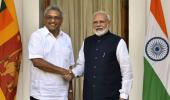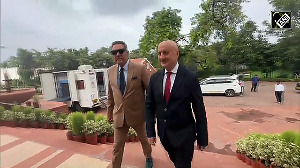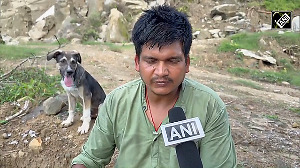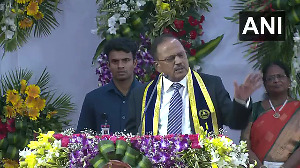Mahinda Rajapaksa is a democratically elected leader who received a massive mandate of 71% of votes, and he owes nothing to Delhi or Washington for staging his political comeback, observes Ambassador M K Bhadrakumar.

The virtual summit between the Indian Prime Minister Narendra Modi and his Sri Lankan counterpart Mahinda Rajapaksa turned out to be somewhat surreal.
The summit was the first of its kind Modi has had with any South Asian leader.
The expectations were high. But fault lines have appeared.
On the core issue of the Sri Lankan Tamil problem, the joint statement (external link) issued after the September 26 summit says, 'Prime Minister Modi called on the Government of Sri Lanka to address the aspirations of the Tamil people for equality, justice, peace and respect within a united Sri Lanka including by carrying forward the process of reconciliation with the implementation of the Thirteenth Amendment to the Constitution of Sri Lanka. Prime Minister Mahinda Rajapaksa expressed the confidence that Sri Lanka will work towards realising the expectations of all ethnic groups including Tamils, by achieving reconciliation nurtured as per the mandate of the people of Sri Lanka and implementation of the Constitutional provisions.'
Clearly, Rajapaksa failed to give any commitment regarding the implementation of the 13th Amendment enacted by the previous government, which came to power in 2015 after his ouster.
Instead, he has spoken of the 'expectations of all ethnic groups including Tamils' and has stated his intention to 'nurture' national reconciliation 'as per the mandate' he received in the February election and the relevant constitutional provisions.
Interestingly, Rajapaksa also called Modi's attention to the 'massive mandate' that he received from the electorate.
Rajapaksa said, 'It is our responsibility to work for all, with all.'
In sum, he has conveyed to Modi that the reconciliation process must have acceptability among the majority Sinhala community -- implying that Delhi is barking up the wrong tree.
The irony is that the Modi government too practises a majoritarian ideology within India.
There is already a demand from the Sinhalese majority community that the 13th Amendment should be scrapped.
Nonetheless, Modi decided to press ahead. Effectively, Rajapaksa has pushed back at Modi's emphatic demand that the implementation of the 13th Amendment is 'essential'.
The Sri Lankan Tamil problem has had a geopolitical dimension, historically.
India has been a star performer on that diplomatic turf.
The Indian intervention took different forms at different times.
Since the late 1970s, for a decade Delhi used the Tamil problem to pressure the pro-western Sri Lankan leadership of then president J R Jayewardene (1978-1989).
But Colombo exhibited exemplary diplomatic skill to ward off India's intrusive policies.
By the mid-1980s Jayewardene brilliantly outmanoeuvred Delhi by enticing it to jettison its previous role as the mentor of the Tamil militant groups and instead be their terminator, and in the process wearing out Delhi so comprehensively that it somehow extricated itself altogether from the Sri Lankan nationality question, finally, to count its losses.
Through the next two decades, geopolitics took a back seat in the Indian calculus, which immensely helped Colombo to successfully defeat the Tamil separatist groups by 2008 after twenty-six years of conflict.
Enter the Modi government.
Geopolitics began staging a comeback almost overnight in 2014, thanks to the animus against China in the Modi government's foreign policy.
By January 2015, for the first time in Sri Lankan history, external powers orchestrated a regime change in Colombo ousting the staunchly nationalist leadership of Rajapaksa who was perceived as 'pro-China' in Delhi and Washington.
A unique feature of the regime change project was that the Tamils organised under the Tamil National Alliance was grated on to it to overthrow an established Sinhala-led government in Colombo.
The TNA will carry this opprobrium for a long time to come.
It was not in Tamil interests to have identified with what was quintessentially a geopolitical project.
In retrospect, although the futility of the 2015 regime change project soon dawned on them, Delhi and Washington decided to double down on the Sri Lankan turf.
This is so because Rajapaksa's return to power in Colombo has coincided with the surge of the US-Indian 'Indo-Pacific strategy' to contain China.
The new agenda is to bring the Rajapaksa government into the orbit of the Quad (Quadrilateral Alliance between the US, Japan, India and Australia.)
But the Sri Lankan nationalists are unwilling to take sides between the Quad and Beijing -- as indeed most countries in the Asian continent.
Hence the renewed use of the Tamil problem to pile pressure on Colombo.
The 'humanitarian intervention' in Sri Lanka is in pursuit of a geopolitical agenda. But Mahinda Rajapaksa is a democratically elected leader who received a massive mandate of 71% of votes, and he owes nothing to Delhi or Washington for staging his political comeback.
The virtual summit last week reveals that Sri Lankan nationalism continues to militate against Delhi's intrusive policy.
Delhi has baited the Sri Lankan religious establishment with a $15 million grant 'for promotion of Buddhist ties', but Colombo will remain vigilant about Indian intentions in cultivating the powerful Buddhist clergy.
The modus operandi in the 2014-2015 period to destabilise the incumbent government must be still fresh in memory.
Colombo is in a far better position than at anytime before to counter US-Indian intervention in Sri Lanka's internal affairs.
Fundamentally, there is a contradiction insofar as while Sri Lanka's external policies are driven by geo-economic considerations, the agenda pursued by India and the US is paramountly geopolitical, drawn from a perspective that the island is a 'permanent aircraft carrier', as a former Indian national security advisor once candidly put it.
The induction of Quad into the Indian Ocean region is an urgent necessity for the US's Indo-Pacific strategy.
An American military presence in Sri Lanka would enable the US to advance a so-called 'island chain strategy' to control the sea lanes of the Indian Ocean, which are of vital importance to China's foreign trade.
Top US officials have been threatening the Sri Lankan government since last year that unless it cooperated with the Indo-Pacific strategy, its human rights record in the war against Tamil separatists in the 2007-2008 period will be held against it and there will be hell to pay.
Without doubt, Rajapaksa accepted Modi's invitation to the virtual summit anticipating the likelihood of the Sri Lankan Tamil problem being brought to the forecourt of the bilateral discourse.
He was ready with a response.
Delhi should think hard how far it is in India's interests to be seen hawking the US's Indo-Pacific strategy in the South Asian region.
Ambassador M K Bhadrakumar, a frequent contributor to Rediff.com, served the Indian Foreign Service for 29 years.
Feature Presentation: Aslam Hunani/Rediff.com












